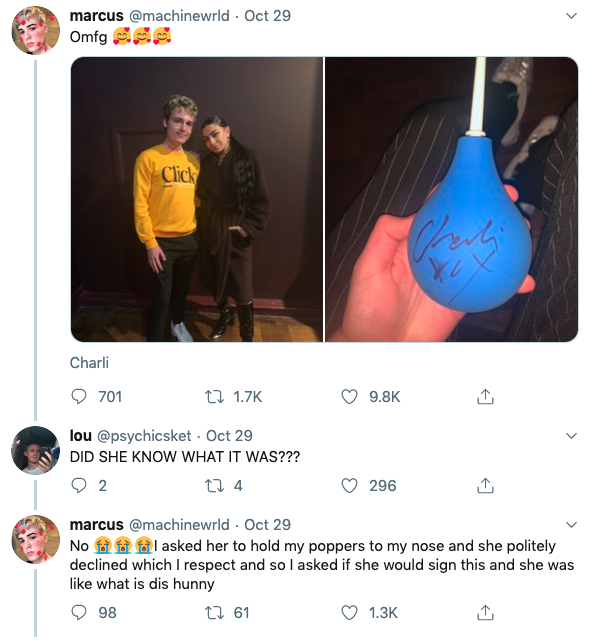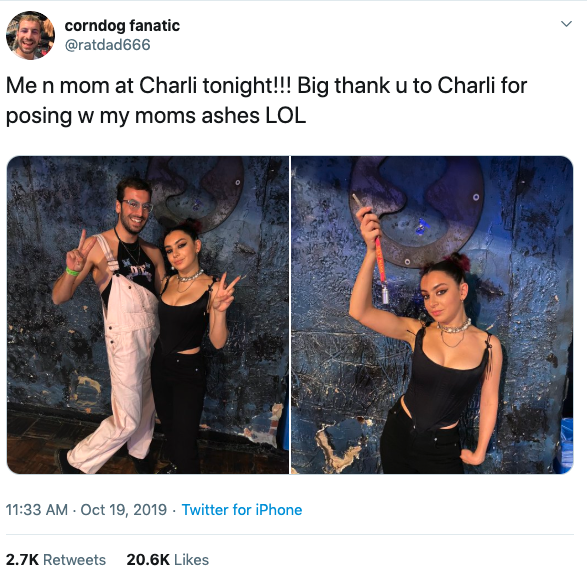Charli XCX’s Queer Male Fans Need To Do Better
Two photos of Charli XCX holding a fan's mum's ashes and signing their douche are emblematic of a much bigger issue around stan culture and queer men.

Two weeks out from releasing her long-awaited third album, Charli XCX was crying on her Instagram live.
Charli had just released ‘Cross You Out’, a collab with Sky Ferreira from the upcoming Charli. The tepid response from a vocal fanbase — passionate and opinionated — had gotten to her.
“Sometimes I just want to quit everything,” she soon wrote in a grid post. “Sometimes I wish I was only a songwriter, not an artist — so I could give my songs to other artists to sing. And then maybe more people would hear them and connect with them.”
This was not the song the fans wanted. They wanted the likes of ‘Taxi’ or ‘Bounce’, two songs from a leaked and abandoned album which leaned hard into the PC Music industrial-pop sounds of her 2016 Vroom Vroom EP, produced by SOPHIE.
Instead, they had a glitching, almost nu metal-influenced ballad — not exactly something you can sniff poppers to.
Which is exactly what they want to do: a few days ago, Twitter user @machinewrld made a storm when he posted a picture of a douche signed by Charli, who he met at a meet and greet.

Screengrab of @machinewrld’s Tweet.
In a follow-up Tweet, he clarified that she didn’t know what the douche was (a rinsing tool used to clean out your anus before sex, in case you’re wondering), and that he had previously asked her to “hold my poppers to my nose and she politely declined”.
The picture comes just a week after another fan asked Charli to pose with a vial of his mother’s ashes, posting the photo to Twitter.

Screengrab of @ratdad666’s tweet.
Both these photoshoots have been criticised widely online, as they essentially force Charli to smile and pose. It’s a power-play built off awkwardness, where they confess their fandom then make an invasive, ridiculous request.
Despite the criticism, both remain online at the time of writing, with both users laughing it off. But when the joke is on the musician they claim to love, they betray a lack of respect for Charlotte Aitchison, the person behind the pop-persona.
Instead, Charli XCX becomes a prop for their own clout: a branding exercise for themselves that takes queer men’s long-standing relationship with female pop-stars too far. But these photos are just the logical end-point of the intense sense of ownership that gay men have created around her.
there is something about the fanbase of a certain female pop artist and the weirdly detached way she is treated as a conduit for their own egos that thoroughly unsettles me but i don’t have the characters to get into the underlying misogyny
— G (@oneofthosefaces) October 29, 2019
Wait, Why Is This A ‘Gay’ Thing?
Last year, Guardian‘s Brian O’Flynn wrote an exceptional piece about misogyny underpinning the way gay fanbases can interact with female pop-stars.
Where queer men have long found a voice through worshipping a pop-diva articulating a femininity they can’t explore, O’Flynn argues, this relationship, already complicated, has grown increasingly toxic over time.
Once we may have merely ventriloquised women’s voices as our own; now, we speak over them, continually arguing over ‘flops’ and ‘bops’, or laughing at their ‘less successful moments’.
“Heckling in smoky nightclubs has been replaced by ‘hate memes’,” he writes, “when stans circulate unflattering edited pictures or examples of a star’s least-becoming behaviour, while the cheering has morphed into a lexicon of superlatives and put-downs that may seem impenetrable to the uninitiated.”
must be cool to be charli xcx and have a significant part of your success contingent on pretending to feel comfortable around the most insufferable fanbase on earth with the lowest comprehension of basic boundaries
— Alex Gallagher (@ALXGLLGHR) October 29, 2019
While queer and ballroom lexicon and AAVE (“yasss”, “queen”, “slay”) have long been adopted by the masses, those terms of worth and endearment are co-opted and tinged with an ironic distance when used by stan bases.
When Carly Rae Jepsen is called the “queen of orange wallet” or “queen of standing”, it’s both a pure expression of love and somewhat disparaging.
If Jepsen can do anything and be a queen, anything she actually does is irrelevant to the act of ‘stanning’ — even failures, which can be seen in the way queer men are always saying someone like Stephanie McKintosh or Heidi Montag invented and saved pop.
For O’Flynn, calling a pop-star a ‘queen’, ‘skinny legend’ or ‘icon’ is incomparably linked to the more negative ‘flop’, as the irony is too palpable.
As he notes, these stan bases are often most belligerent when they feel the artist or album is ‘underrated’, critically or commercially. Years later, people are still tweeting #Justice4ArtPop and #Justice4Bionic, which seems crueler than it is kind, especially when it’s impossible to tell whether their enjoyment is ironic or sincere (this author is not immune).
i hope that person who asked charli xcx to hold poppers up to his nose and sign his douche apologizes to her because that's such a weird and disgusting way to treat her. she's not some prop you can milk sexual jokes out of, stop harassing her and learn how to be considerate.
— abe: the re-up (@stubbornsticks) October 28, 2019
Given that many queer men live and die by these artists whose music is an integral or vital part of their own queerness, their standom often breeds a more innocuous misogyny, where we speak over women with our passion.
But Why Is It So Bad With Charli, Baby?
Charli XCX’s career and persona has positioned her uniquely as a near-perfect pop-star for a rabid queer fanbase. An underdog through and through, Charli has continually found most success outside of her own music.
A talented songwriter, Charli’s biggest hits have continually been performed by other artists, including ‘Señorita’, or merely feature her, such as two of 2013’s biggest songs (‘Fancy’, ‘I Love It’).
Meanwhile, her biggest song to date, ‘Boom Clap’, is openly detested by Charli and her fanbase. Speaking on …And The Writer Is podcast, Charli expressed a deep dismay and frustration throughout her career of having the music she doesn’t care about blow up, and her babies wither in relative obscurity.
Critical acclaim and cult status began in 2016 with the release of Vroom Vroom: working alongside A.G. Cook and other hyped-pop producers crystallised the party-fuelled personality found across her music.
Two follow-up mixtapes in 2017 — No. 1 Angel and Pop 2 — positioned her as “the future of pop”, an artist whose vision proved too eclectic for radio play but perfect for pioneers.
Charli seemed caught in a cross-roads best exemplified by her support slot on Taylor Swift’s reputation tour last year. Her set was restricted to early hits and the break-through moments like ‘Boys’, missing the fan-favourites in favour of ‘Boom Crap’, as it was written on the setlist.
If I was Charli I’d cancel the rest of my meet and greets and replace the entire setlist with Boom Clap 17 times that’s what gays deserve https://t.co/oFx20Y2zTf
— ??????? ✰ (@kennedy_mp3) October 28, 2019
In the mean-time, Charli was throwing Pop 2 concerts and sweaty, tiny 200-person club nights on the side in major cities: the songs and atmosphere couldn’t have been more different. Reputation was the stadium spectacle; Pop 2 was the queer party.
While many pop-stars parade around with pride flags and call it a day, Charli does the work, routinely collaborating with LGBTIQ acts big and small. Moving forward, how would she manage pop-stardom without sacrificing the genuine sense of community her music had fostered?
Charli‘s lead single seemed to answer the question. ‘Blame It On Your Love’ was a revised mix of Pop 2‘s oddest song ‘Track 10’, with Lizzo thrown in for good measure — it has its own merits, but trades in the original’s electricity for the promise of play-listing. Fans worried her label was too concerned with radio hits: in reality, Charli contains some of her weirdest songs yet.
But when Charli’s US and UK tour began last month, select fans were aggressively angry that her album tour’s setlist included so many ‘flops’ from her just-released album.
“To everyone commenting all this negative shit I don’t really know what to say. I’m trying my best out here,” she wrote in response, before altering the set-list the next night.
To everyone commenting all this negative shit I don’t really know what to say. I’m trying my best out here.
— Charli (@charli_xcx) September 21, 2019
We may simply have to stan, but it’s unclear whether stanning means championing an underdog, or pushing them down. In New York last week, Charli played the long-requested ‘Taxi’ pre-show to troll her crowd, and fans celebrated “bullying” her into submission. Sure, she’s playing along and signing a douche, but can you really be part of the joke when someone’s twisting your arm?
Jared Richards is a staff writer at Junkee, and co-host of Sleepless In Sydney on FBi Radio. Follow him on Twitter.



